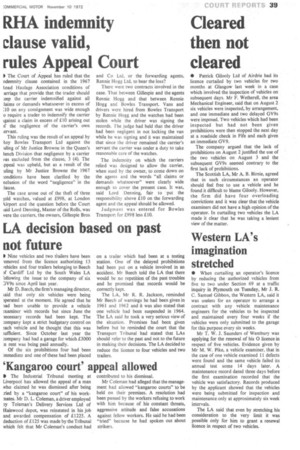RHA indemnity clause valid, rules Appeal Court
Page 41

If you've noticed an error in this article please click here to report it so we can fix it.
I The Court of Appeal has ruled that the ndemnity clause contained in the 1967 toad Haulage Association conditions of :arriage that provide that the trader should :eep the carrier indemnified against all hams or demands whatsoever in excess of 10 on any consignment was wide enough o require a trader to indemnify the carrier tgainst a claim in excess of £10 arising out if the negligence of the carrier's own ;cry ant.
This ruling was the result of an appeal by toy Bowles Transport Ltd against the uling of Mr Justice Browne in the Queen's lench Division that negligence by a carrier vas excluded from the clause, 3 (4). The tppeal was upheld, but as a result of the uling by Mr Justice Browne the 1967 :onditions have been clarified by the nclusion of the word "negligence" in the The case arose out of the theft of three ;old watches, valued at £998, at London kirport and the question before the Court aid Lord Denning, Master of the Rolls, was yere the carriers, the owners, Gillespie Bros and Co Ltd, or the forwarding agents, Rennie Hogg Ltd, to bear the loss?
There were two contracts involved in the case. That between Gillespie and the agents Rennie Hogg and that between Rennie Hogg and Bowles Transport. Vans and drivers were hired from Bowles Transport by Rennie Hogg and the watches had been stolen while the driver was signing the records. The judge had held that the driver had been negligent in not locking the van while he was signing and it was maintained that since the driver remained the carrier's servant the carrier was under a duty to take reasonable care of the watches.
The indemnity on which the carriers relied was designed to allow the carrier, when sued by the owner, to come down on the agents and the words "all claims or demands whatsoever" were clearly wide enough to cover the present case. It was, said Lord Denning, fair to 'put the responsibility above £10 on the forwarding agent and the appeal should be allowed.
Judgment was entered for Bowles Transport for £998 less £10.




































































































































